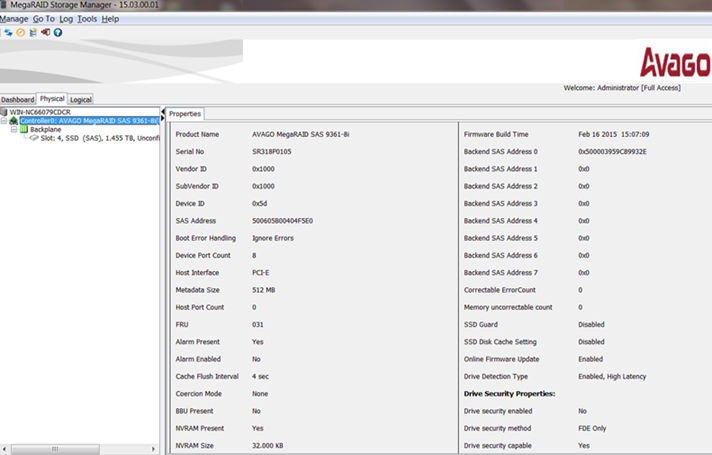If a controller is operating normally, the controller icon looks like this: ![]() . If a controller has failed, a small red circle appears next to the icon.
. If a controller has failed, a small red circle appears next to the icon.
Figure 87. Controller Properties
In the above dialog, the following properties appear under the High Availability Properties heading if the controller supports High Availability DAS:
|
|
Topology Type - Indicates whether clustering is supported or not on the controller. Possible values for this field are Server Storage Cluster, or None. |
|
|
Maximum Controller Nodes - Indicates the total number of servers in a cluster. |
|
|
Domain ID - Shows the domain ID of the two servers in a cluster. The domain ID for both the servers is the same. |
|
|
Peer Controller Status - Indicates if both the servers in a cluster are running or not. The possible values are Active, Inactive, or Incompatible. |
|
|
Incompatibility Details - Indicates the reason for the incompatibility between the servers in a cluster. The possible values are FW Level Mismatch, HW Incompatibility, Controller Property Mismatch, Premium Features Mismatch, or None. |
NOTE If the controller does not support High Availability DAS, only the Topology Type property appears under the High Availability Properties heading, with the value None.
The Rebuild rate, Patrol read rate, Reconstruction rate, Consistency check rate, and BGI rate (background initialization) are all user selectable. For more information, see Changing Adjustable Task Rates.
The BBU Present field indicates whether a battery backup unit is installed.
The Alarm Enabled field indicates whether the controller has an alarm to alert the user with an audible tone when there is an error or a problem on the controller. Options are available for disabling or silencing the alarm by right clicking on a controller icon or by selecting Go To > Controller menu.
